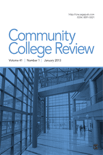
Community College Review
Scope & Guideline
Elevating Research in Community College Education
Introduction
Aims and Scopes
- Student Success and Persistence:
Research focusing on factors influencing student success and retention rates, particularly among diverse populations, including first-generation college students, immigrant students, and those facing socio-economic challenges. - Transfer Pathways and Articulation:
Investigations into the pathways community college students take to transfer to four-year institutions, including barriers and facilitators in the transfer process. - Workforce Development and Economic Impact:
Studies exploring the role of community colleges in workforce development, aligning educational programs with labor market needs, and the economic implications of community college education. - Diversity, Equity, and Inclusion:
Research addressing issues of racial equity, gender disparities, and the experiences of marginalized groups within the community college system. - Policy Analysis and Institutional Practices:
Examinations of policies affecting community colleges, including developmental education reforms, funding models, and institutional strategies for improving student outcomes. - Mental Health and Wellbeing:
Focus on the mental health challenges faced by community college students and the institutional support systems available to promote student wellbeing. - STEM Education and Engagement:
Research centered on the participation and success of community college students in STEM fields, including barriers to engagement and strategies to enhance retention in these disciplines.
Trending and Emerging
- Food Insecurity and Basic Needs:
An increasing number of articles are addressing food insecurity and other basic needs challenges faced by community college students, emphasizing the importance of holistic support systems to enhance student success. - Impact of COVID-19:
Research examining the effects of the COVID-19 pandemic on community college students, including shifts in learning modalities, mental health, and academic performance, is gaining traction as institutions adapt to new realities. - Community College Leadership and Faculty Roles:
Emerging studies are focusing on the roles of faculty and leadership in fostering student success and engagement, particularly in light of changing educational landscapes and institutional challenges. - Racial Equity and Social Justice:
There is a growing emphasis on racial equity and social justice within community college research, reflecting broader societal movements and the need for systemic change in educational practices and policies. - STEM Pathways for Underrepresented Groups:
A notable trend is the focus on enhancing STEM pathways for underrepresented groups, with studies exploring strategies to increase participation and success rates among diverse student populations. - Mental Health Support Systems:
Increasing attention is being paid to mental health support systems within community colleges, recognizing the critical role of mental health in student retention and academic performance.
Declining or Waning
- Traditional Developmental Education Models:
Research related to traditional developmental education practices is declining, as there is a shift toward more innovative and integrated approaches that emphasize student-centered learning and success. - General Community College Experiences:
Broad studies focusing solely on community college experiences without specific angles (such as demographic factors or academic pathways) are less frequent, indicating a trend toward more targeted research. - Purely Quantitative Assessments:
There is a noticeable decline in studies that rely solely on quantitative methods without qualitative insights, as the journal increasingly values mixed-methods approaches that capture the complexities of student experiences. - Non-Academic Student Life:
Research exploring non-academic aspects of community college life, such as social engagement and extracurricular activities, appears to be waning, possibly overshadowed by the pressing issues of academic success and equity.
Similar Journals

International Journal of Multicultural Education
Advancing multicultural scholarship for a just future.The International Journal of Multicultural Education (IJME), published by EASTERN COLL, DEPT EDUCATION, is a leading open-access journal dedicated to advancing the field of multicultural education. Established in 2007, this journal has become an essential platform for researchers, educators, and policymakers interested in exploring the complexities of education in diverse cultural contexts. With an impressive impact factor and strong rankings in multiple categories including Q1 in Anthropology and Cultural Studies, and Q2 in both Education and Social Sciences, the IJME provides high-quality, peer-reviewed articles that contribute to impactful educational practices and scholarship. The journal's open access model ensures that its invaluable research reaches a global audience, fostering dialogue and collaboration among academics, practitioners, and students. By focusing on themes that address social justice, equity, and cultural awareness in education, the IJME plays a critical role in shaping inclusive and effective educational frameworks for the future.

Frontiers in Education
Elevating Educational Standards Through Open Access.Frontiers in Education is a distinguished open-access journal published by FRONTIERS MEDIA SA, dedicated to the advancement of educational research and practice. Launched in 2016, this journal has quickly established itself within the field, attaining a Q2 ranking in Education for 2023, positioning it among the top-tier publications in the field. With a Scopus rank of #580 out of 1543, it lies in the 62nd percentile, highlighting its significance and reach within the scholarly community. Based in Lausanne, Switzerland, Frontiers in Education aims to provide a collaborative platform for educators, researchers, and practitioners to disseminate high-quality research findings and innovative educational practices. As an open-access publication, it not only champions the principles of accessibility but also enhances the visibility and impact of its published work. This journal is instrumental in shaping the future of education through rigorous research, critical analysis, and the promotion of best practices, making it an essential resource for anyone invested in the field.

JOURNAL OF FURTHER AND HIGHER EDUCATION
Catalyzing Change in Educational PracticesJournal of Further and Higher Education, published by Routledge Journals, Taylor & Francis Ltd, stands as a prominent platform in the field of education, with a distinguished focus on further and higher education studies. With an ISSN of 0309-877X and E-ISSN of 1469-9486, this journal has been contributing invaluable insights since its inception in 1977. The journal boasts a remarkable Q1 ranking in its category for 2023, placing it in the top tier of educational research, underscored by its 83rd percentile ranking among Scopus Ranks in Social Sciences - Education. Researchers and practitioners alike are encouraged to submit their work, as the journal aims to foster innovative discussions and disseminate high-quality scholarly articles that address contemporary challenges in further and higher education. With its commitment to academic excellence, Journal of Further and Higher Education plays a crucial role in shaping policy and practice in the educational landscape, ensuring that the voices of educators and learners are heard and valued.
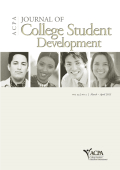
JOURNAL OF COLLEGE STUDENT DEVELOPMENT
Innovating Student Affairs for a Brighter TomorrowJOURNAL OF COLLEGE STUDENT DEVELOPMENT is a premier academic publication dedicated to advancing the field of higher education and student affairs. Published by Johns Hopkins University Press, this journal holds a distinguished Q1 ranking in Education for 2023 and ranks 582nd out of 1543 in the Scopus database, placing it in the 62nd percentile among social sciences education journals. The journal aims to provide contemporaneous insights and empirical research that foster the development of college students, with a focus on enhancing student experiences, promoting well-being, and advocating for effective educational policies. Though it does not offer open access options, it remains a vital resource for researchers, professionals, and students alike, who are invested in exploring innovative approaches to student success and engagement. With a continuous publication span from 1996 to 2024, JOURNAL OF COLLEGE STUDENT DEVELOPMENT serves as a cornerstone for scholarly discourse in the dynamic landscape of higher education.
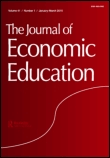
JOURNAL OF ECONOMIC EDUCATION
Advancing Economic Literacy through Scholarly ResearchJOURNAL OF ECONOMIC EDUCATION, published by Routledge Journals, Taylor & Francis Ltd, serves as a pivotal platform for the dissemination of research in the vital intersection of economics and education. With an ISSN of 0022-0485 and an E-ISSN of 2152-4068, this esteemed journal has been contributing to the field since 1969 and continues to evolve with influential insights projected through to 2024. Ranking in the Q2 category for both Economics and Econometrics, and Education as of 2023, it demonstrates a significant commitment to enhancing educational practices in economics. Researchers and educators alike will find value in its empirical studies, theoretical explorations, and innovative pedagogical approaches. Although currently not offering open access, the journal maintains a competitive reputation with a Scopus rank placing it in the 54th and 47th percentiles across its related fields. Join the scholarly dialogue that shapes the future of economic education and informs teaching methodologies across the globe.
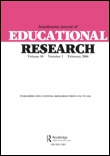
Scandinavian Journal of Educational Research
Exploring innovative solutions for contemporary educational challenges.The Scandinavian Journal of Educational Research is a premier academic publication dedicated to advancing the field of education through rigorous research and comprehensive analysis. Published by Routledge Journals, Taylor & Francis Ltd, this journal has established itself as a vital resource for educators, researchers, and policymakers, especially with its notable Q1 ranking in the Education category and its impressive Scopus ranking of 242 out of 1543 in the realm of social sciences. With its ISSN: 0031-3831 and E-ISSN: 1470-1170, the journal encompasses a diverse range of topics, reflecting on educational theory, practice, and policy across the Scandinavian context and beyond. Featuring contributions from esteemed scholars, the journal fosters insightful dialogues and innovative solutions to contemporary educational challenges. With convergence spanning from 1971 to 2024, it remains an indispensable part of the academic landscape for those keen to explore the multifaceted nature of education.
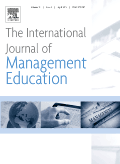
International Journal of Management Education
Driving Excellence in Management Research and PracticeThe International Journal of Management Education (ISSN: 1472-8117, E-ISSN: 2352-3565), published by Elsevier Sci Ltd, stands at the forefront of educational research in management, firmly establishing itself in the prestigious Q1 category in both Education and Strategy and Management. With its impactful contributions since its inception in 1970, the journal plays a pivotal role in fostering dialogue between academia and industry, ensuring access to high-quality research that shapes management education practices worldwide. Ranked #48 of 1543 in the Social Sciences sector and #55 of 478 in Strategy and Management according to Scopus, it offers a unique platform for insights and discoveries that drive the evolving landscape of management knowledge. Although currently not open access, this journal provides unlimited access to essential research developments, making it invaluable for researchers, professionals, and students dedicated to the advancement of management education. From new teaching methodologies to innovative leadership strategies, the journal encapsulates the spectrum of contemporary issues and educational practices vital for fostering future leaders.
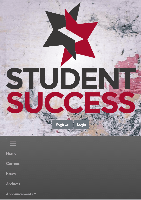
Student Success
Elevating Student Experiences, One Study at a Time.Student Success is a pioneering open-access journal published by Queensland University of Technology, focusing on the multifaceted aspects of education and success in academic settings. With its ISSN 2205-0795 and E-ISSN 2205-0795, this journal has been fostering innovative research and discussions since it opened its doors in 2015. Distributed from its base in Brisbane, Australia, it has established itself as a vital resource in the education sector, holding a respectable Q3 category rank in Education for 2023 and ranking #837 out of 1543 in the Scopus Social Sciences field. The journal's commitment to disseminating high-quality research aims to enhance the educational experience for students and professionals alike, making it a crucial platform for those dedicated to academic success. The open-access model ensures that cutting-edge research is accessible to a global audience, thereby enriching educational practices and outcomes worldwide.
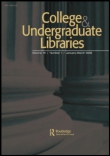
College & Undergraduate Libraries
Shaping the Future of Academic Libraries for Student Success.College & Undergraduate Libraries is an esteemed journal published by ROUTLEDGE JOURNALS, TAYLOR & FRANCIS LTD, focusing on the advancement of library services tailored for college and undergraduate institutions. With an ISSN of 1069-1316 and an E-ISSN of 1545-2530, this journal serves as a crucial platform for researchers, educators, and practitioners to disseminate innovative practices, empirical studies, and theoretical frameworks related to education and library science. Showcasing a commitment to excellence, it ranks in the Q2 category in Library and Information Sciences and Q3 in Education and E-learning as of 2023, according to the Scopus metrics. The journal spans a rich history from 1994 to 2004 and has continued to provide valuable insights from 2006 to the present, making it a vital resource for those aiming to enhance undergraduate library experiences. While it is not an open access publication, its contents can be accessed through institutional subscriptions, ensuring that it reaches a wide audience. By contributing to the dialogue surrounding the future of academic libraries, College & Undergraduate Libraries stands as a key resource in shaping the landscape of library services and education.
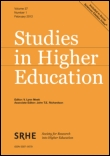
STUDIES IN HIGHER EDUCATION
Uncovering the Dynamics of Learning and Policy in Higher EducationStudies in Higher Education is a premier academic journal published by Routledge Journals, Taylor & Francis Ltd, focusing on the dynamic and evolving landscape of higher education. With an illustrious history spanning from 1976 to 2024, this journal is ranked in the top quartile of education journals (Q1) and holds an impressive Social Sciences Educational Scopus rank of #49 out of 1543, placing it in the 96th percentile. This makes it an invaluable resource for researchers, educators, and policymakers seeking to understand and shape the future of higher education. Through rigorous peer-reviewed articles, the journal covers the multifaceted aspects of higher education, including pedagogical innovations, policy analysis, and institutional challenges. While it does not currently operate under an open-access model, access to its rich repository of research ensures that stakeholders in academia can stay at the forefront of critical discussions and transformative practices in education. The journal’s impact within the field underscores its commitment to advancing knowledge and fostering scholarly dialogue, making it a must-read for those dedicated to improving educational outcomes.